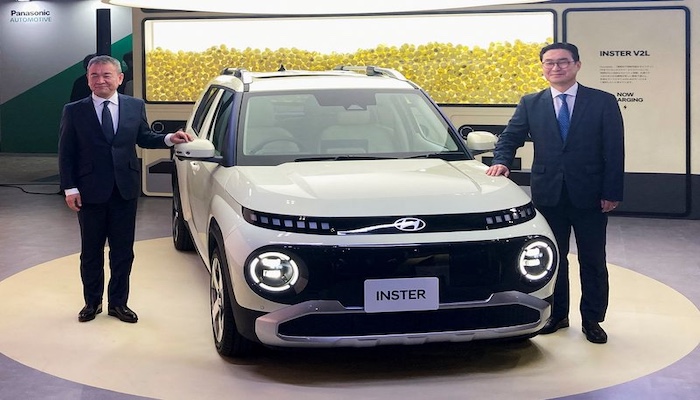
Hyundai will introduce the least expensive compact EV in Japan to take on regional giants
Hyundai launched the Inster, a cheap, little EV, to increase sales and take on the leading automakers in Japan.
In a daring attempt to break into a sector long controlled by Japanese automakers with well-established gasoline and hybrid technology, Hyundai Motor Co. has revealed intentions to launch the most reasonably priced compact electric vehicle (EV) in Japan.
The South Korean carmaker made its approach public on Friday at the Tokyo Auto Salon.
The new car, called the “Inster,” will be the least cheapest compact EV in Japan, with a starting price of 2.85 million yen ($18,000). BYD’s Dolphin, which made its debut in 2023 with a starting price of 3.63 million yen, is undercut by this price.
Toshiyuki Shimegi, CEO of Hyundai Mobility Japan, stated that the Inster is essential to Hyundai’s goal of becoming a major player in the Japanese market.
At a press conference, Shimegi said, “Inster is our core product to win Japanese customers’ recognition.” Over the following five years, the corporation wants to tenfold increase its revenues in Japan, he added.
Beginning in May, Japanese consumers will be able to purchase the Inster, which was first released in Europe last year as the Casper Electric in South Korea. Hyundai intends to win over budget-conscious Japanese customers by pursuing a low-cost strategy akin to that of China’s EV leader BYD.
The action was taken because EV adoption in Japan is trailing behind other key markets. Less than 23,000 Nissan Motor’s Sakura, the nation’s best-selling ultra-compact “kei car” EV, were sold in 2024, a roughly 40% decrease from the year before.
At 2.60 million yen, the Sakura is still a unique automobile in a market for passenger cars that sells about 4 million cars a year, of which EVs make up a very small percentage.
After leaving Japan in 2009 owing to low sales, Hyundai will return in 2022 with a sole focus on electric and hydrogen fuel cell vehicles. By capitalizing on the rising demand for ecologically friendly automobiles, the company now hopes to challenge the supremacy of Japanese automakers like Toyota, Honda, and Nissan.
Hyundai’s sales in Japan have been modest despite its re-entry; last year, it sold 607 cars, compared to 2,223 for BYD. Another international rival, Tesla, has not revealed its sales numbers in Japan.
“With Inster, we aim to provide Japanese consumers with an EV option that is both high-quality and reasonably priced, meeting their expectations,” Shimegi stated.
Hyundai, which, combined with Kia, makes up the third-largest automotive company in the world, is placing its bet on its affordable, small EV to compete in a difficult market. It’s unclear if this tactic will be successful in influencing Japanese consumers.
All Categories
Recent Posts
Al Ahly shows strong interest in Pimienta
Pirates lose to Chiefs in the Nedbank Cup final
Tags
+13162306000
zoneyetu@yahoo.com



